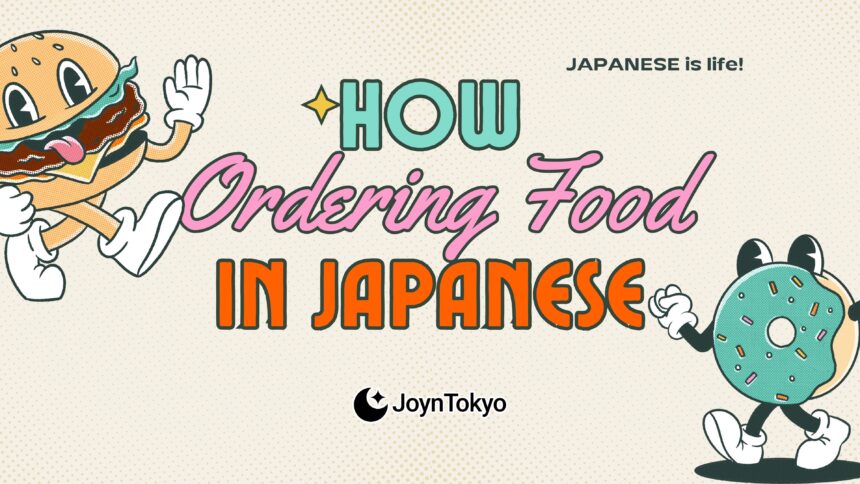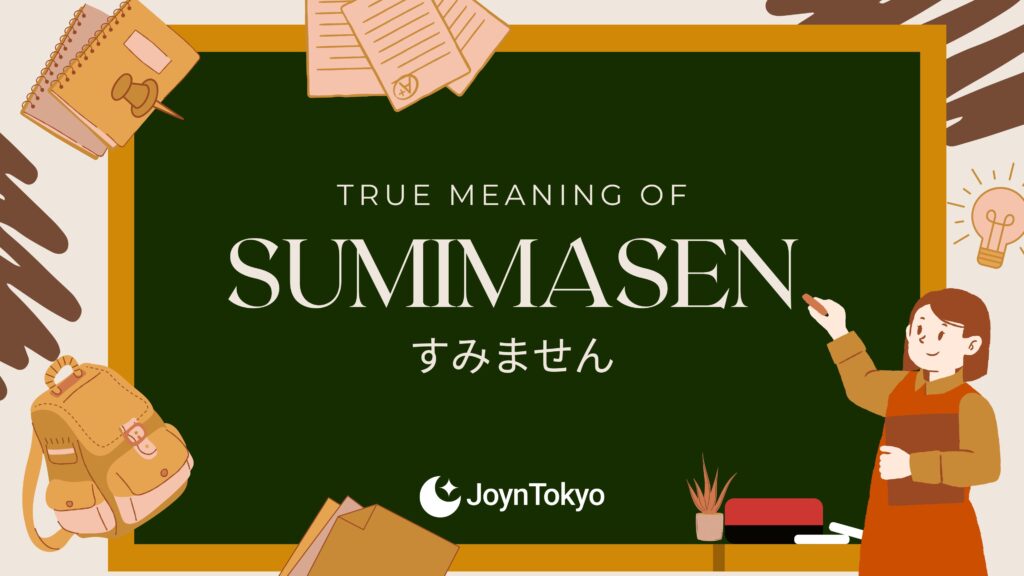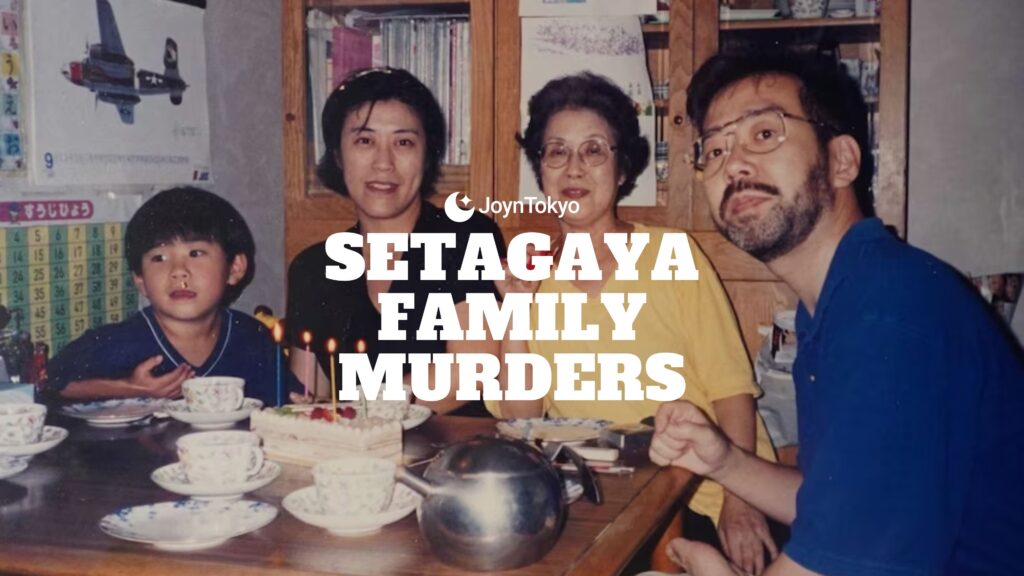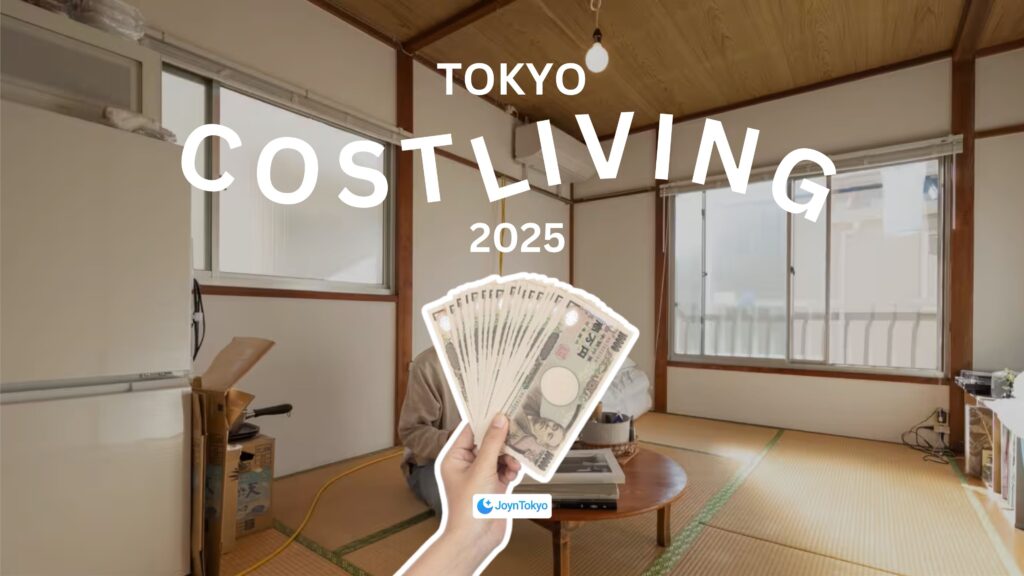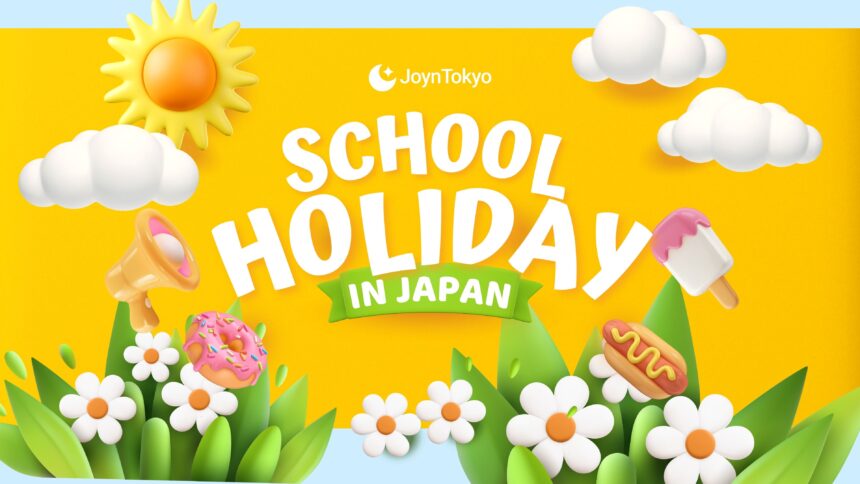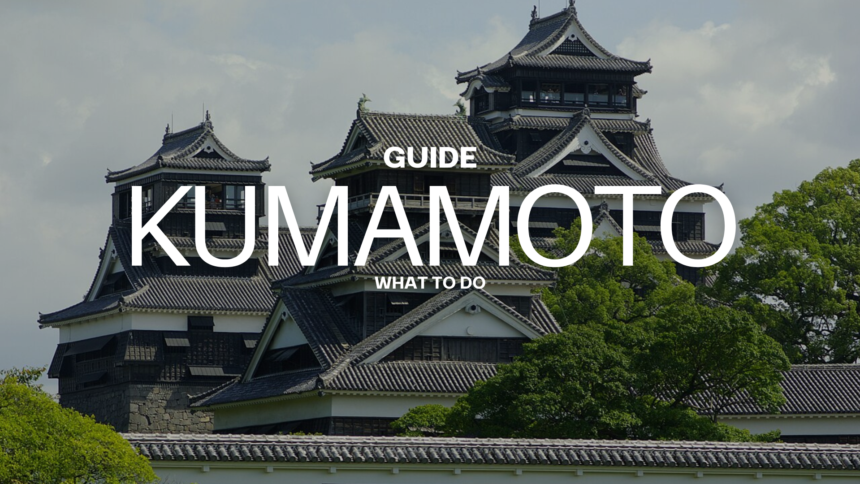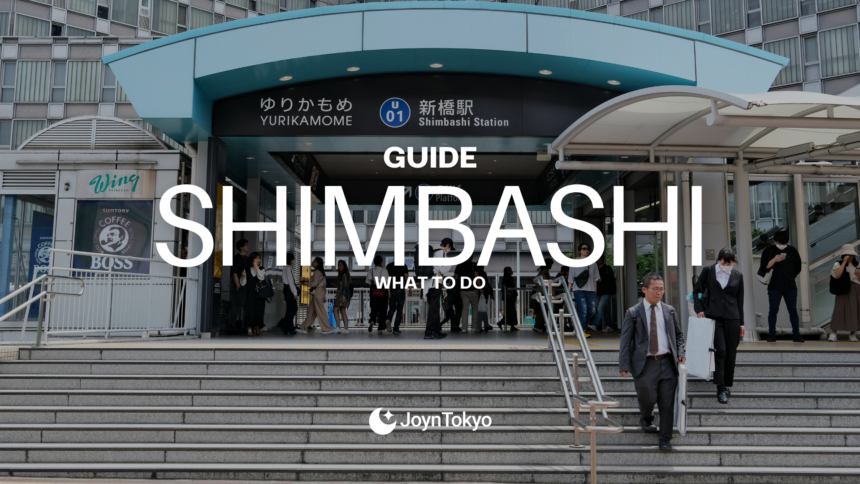Eating out in Japan is one of the most enjoyable ways to experience the culture, but for many foreigners it can feel intimidating. Unlike in some countries where staff approach you quickly, Japanese restaurants often expect customers to take the lead with a few key phrases. This guide will walk you step by step through entering a restaurant, ordering food and drinks, and leaving politely, so you can enjoy dining in Japan with confidence.
What To Say When Entering Japanese Restaurant
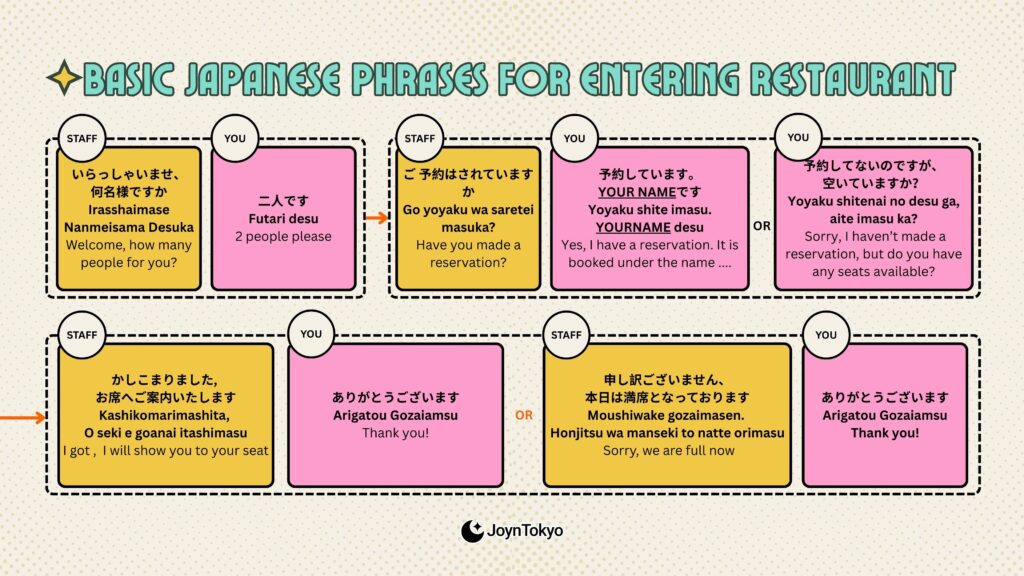
Walking into a Japanese restaurant is often a bit of surprise for first-timers. The staff will usually greet you with a loud and cheerful “Irasshaimase!” (いらっしゃいませ), which means “Welcome.” You don’t need to reply, but you will need to tell them your party size, and sometimes your seating preference. In larger restaurants, the staff may also ask whether you want a smoking or non-smoking seat. Learning a few simple responses will make this step smooth and stress-free.
Hitori desu (一人です)
Meaning: “Just one person.”
Say this at the entrance if you’re dining alone. Staff will usually guide you to a small table or, more often, a counter seat.
Futari desu (二人です)
Meaning: “Two people.”
Use this to tell staff your group size. Replace futari with san-nin (three people), yon-nin (four people), and so on for your group.
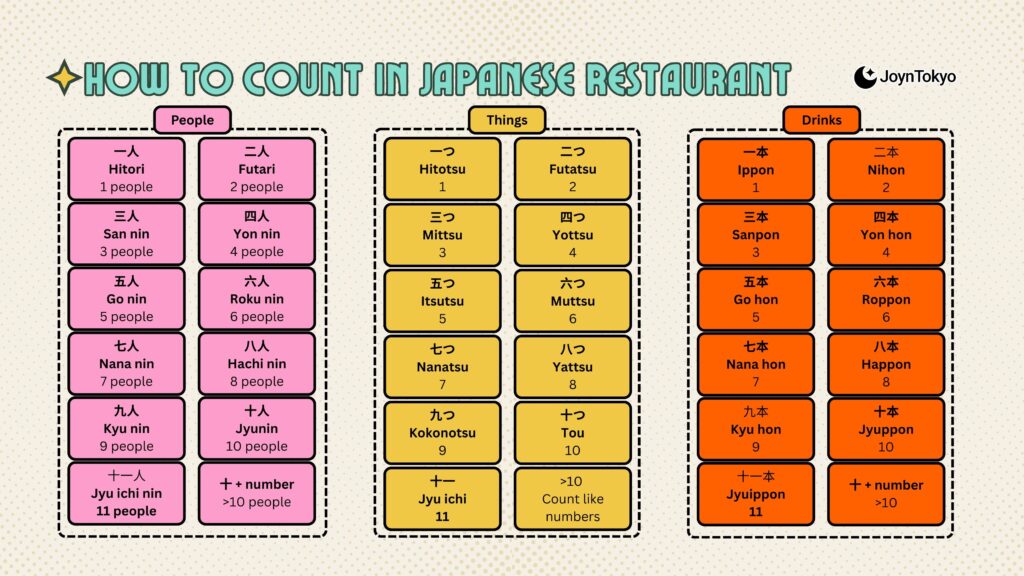
Kinen seki onegaishimasu (禁煙席お願いします)
Meaning: “Non-smoking seat, please.”
If you prefer a non-smoking area, use this phrase when the staff is seating you. Most restaurants in Japan are non-smoking spaces, yet there are some all-smoking-seat restaurants as well. We strongly recommend to do the research in advance and if you see the phrase “zenseki kinen (全席禁煙)”, that means the place does not allow smoking at all.
That said, even places that allow smoking have non-smoking areas — although they can sometimes be just seats in a “non-smoking” area next to tables that allow customers to puff away.
Yoyaku shita __ desu. (予約した__です。)
Meaning: “I am __ who reserved the table.”
This is a phrase commonly used when you made a reservation for a table at the place. Sometimes, they will ask you for the number of people you are with, so it will be smart to remember the phrase the related phrases above like “Futari desu.”
How to Order Food in Japanese
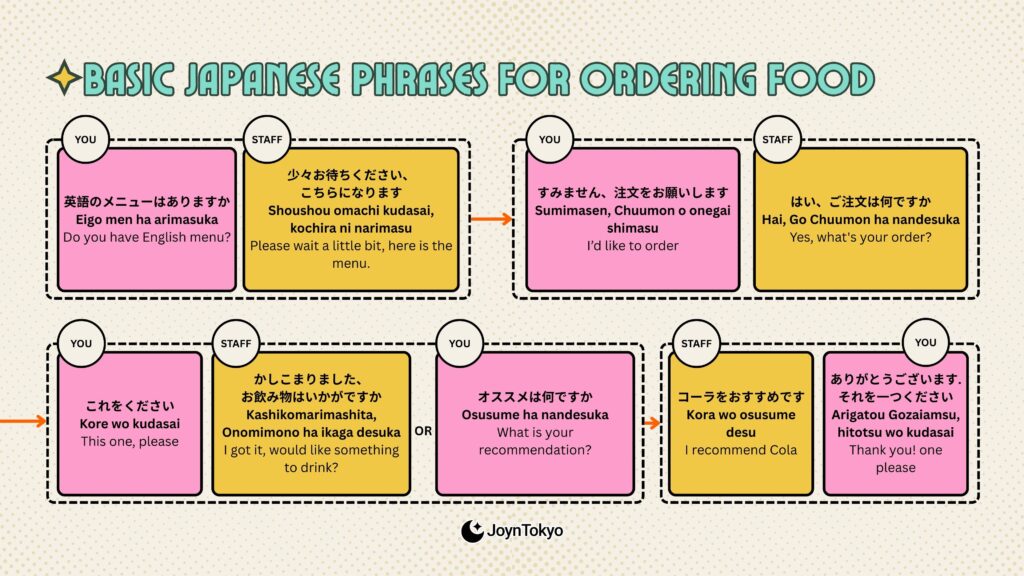
Once seated, the next step is getting the server’s attention and placing your order. Unlike in many Western countries, Japanese staff do not always come to your table right away: you are expected to call them over. Don’t worry, this is completely normal and considered polite if done properly. Once you have their attention, you can order food, drinks, or make adjustments to your meal. Mastering a few key expressions here will make ordering smooth and efficient.
Sumimasen (すみません)
Meaning: “Excuse me.”
Raise your hand slightly and say this to call the server’s attention. This is the standard way to get service in Japan. It may feel rude, but in Japan it is normal; unless you yell or attempt to summon your waiter in a presumptuous manner.
| Example sentence | Meaning |
|---|---|
| すみません、お水ください。 (Sumimasen, omizu kudasai*.*) | Excuse me, may I have a water? |
| すみません、注文いいですか。 (Sumimasen, chumon iidesuka.) | Excuse me, may I order? |
Read More
___ wo onegaishimasu (___をお願いします)
Meaning: “___, please.”
Use this to order a single item. Better to point at the item on the menu.
| Example sentence | Meaning |
|---|---|
| ラーメンお願いします。 (Ramen onegaishimasu.) | I would like to have ramen. |
| すき焼きお願いします。(Sukiyaki onegaishimasu.) | I would like to have sukiyaki. |
___ to ___ o onegaishimasu (___と___をお願いします)
Meaning: “___ and ___, please.”
Say this when you want to order multiple items at the same time.
| Example sentence | Meaning |
|---|---|
| ラーメンとチャーハンお願いします。 (Ramen to chahan onegaishimasu.) | I would like to have ramen and fried rice. |
| すき焼きとご飯お願いします。(Sukiyaki to gohan onegaishimasu.) | I would like to have sukiyaki and bowl of rice. |
Nama kudasai (生ください)
Meaning: “Beer, please.”
A common way to order drinks. Nama is the Japanese slang for beer (”nama” meaning “draft”), and it is often used like “nama hitotsu (生ひとつ)” which means “one beer please”. It is very common, and popular for people to order beer as their first drink of a day. Many will start their night by saying, “mazu wa biiru” (まずはビール), or “I’ll have a beer first!”
Ordering Food in Japan With Dietary Restrictions (Vegetarian, Halal, Gluten-Free)
Japan is becoming more aware of dietary restrictions, but many small restaurants are still not fully familiar with vegetarian, vegan, or halal diets. That’s why learning a few phrases to explain your needs is essential. By clearly stating what you can and cannot eat, you make it easier for staff to guide you toward safe options. Even if the restaurant cannot meet every request, showing effort to explain politely is always appreciated.
Niku wa haitte imasuka? (肉は入っていますか?)
Meaning: “Is meat in this dish?”
Say this if you want to ask whether the meal use meat or not. It is a useful phrase especially if you do not want and cannot consume meat. As an alternative, there is a phrase “niku o tabere masen (肉を食べれません)”, which means “I cannot eat meat”, and usually the waiter will understand and introduce you the no-meat menus. However, we cannot assure such a treatment to always happen, so better to go with the question phrase above to ensure the dish yourself!
Watashi wa bejitarian desu (私はベジタリアンです)
Meaning: “I am vegetarian.”
Use this to explain your diet in general. It’s especially useful if staff recommends dishes. Not many people in Japan knows the difference between vegan and vegetarian, so it is better to know the terms of your unavailable foods like meat (niku/肉), egg (tamago/卵), and milk (gyunyu/牛乳).
Watashi wa gūruten arerugī ga arimasu (私はグルテンアレルギーがあります)
Meaning: “I have a gluten allergy.”
Important to say if you need to avoid noodles, soy sauce, or bread-based dishes. If you want to ask whether the place have gluten-free options or not, you can say “Guruten fri no mono wa arimasu ka? (グルテンフリーのものはありますか)”. Again, just like vegetarian and vegan, gluten is quite a new term in Japan and not everyone knows its meaning. As such, it is better to know the terms koimugi, which means “wheat” in Japanese.
Hararu ryōri wa arimasu ka? (ハラル料理はありますか)
Meaning: “Do you have halal food?”
Ask this at restaurants to check if they offer halal-friendly meals. However, most of the restaurants in Japan do not have halal foods, so it is the best if you do a research and attend the place where is halal friendly. When you go shopping at the supermarkets and want to ask for halal foods, use “Hararu shokuhin arimasu ka?” instead, which means “Do you have halal foods (ingredients) here?”.
What to Say Before and During the Meal in Japanese
Japanese dining involves a few cultural expressions that go beyond just ordering food. These phrases express gratitude for the meal and respect for the people who prepared it. Using them will make your dining experience feel more authentic and appreciated by staff. They are also easy to learn, and even saying them once will leave a positive impression.
Itadakimasu (いただきます)
Meaning: “I humbly receive.”
Say this before you start eating as a sign of gratitude for the food. Sometimes, people will do a quiet clap in front of their face while saying this phrase. It is considered rude or disrespectful towards the cook if you start eating without saying this.
Omizu kudasai (お水ください)
Meaning: “Water, please.”
Use this if water hasn’t been brought to your table or if you’d like a refill. “Ohiya” is another term for water, so you can also say, “Ohiya kudasai” if you want to sound a bit more local, though this is typically reserved for izakaya.
Ohashi kudasai (お箸ください)
Meaning: “Chopsticks, please.”
Say this if chopsticks are missing or you drop yours and need a replacement. If the waiter asked for the number, you can answer “ichizen (one pair of chopstick)”, “nizen (two pairs of chopstick)”, “sanzen (three pairs of chopstick)”, etc.
Oishii desu (美味しいです)
Meaning: “It’s delicious.”
Use this during the meal to compliment the food. It’s a nice way to show appreciation towards the servers. You can say this during the meal towards the waiters, but since there are no specific waiter who will serve you in the restaurant in Japan, it is more natural to say this to the people you are coming with. However, it is a nice thing to say anyway, so you can tell the waiter to make them smile!
Asking for the Check in Japanese
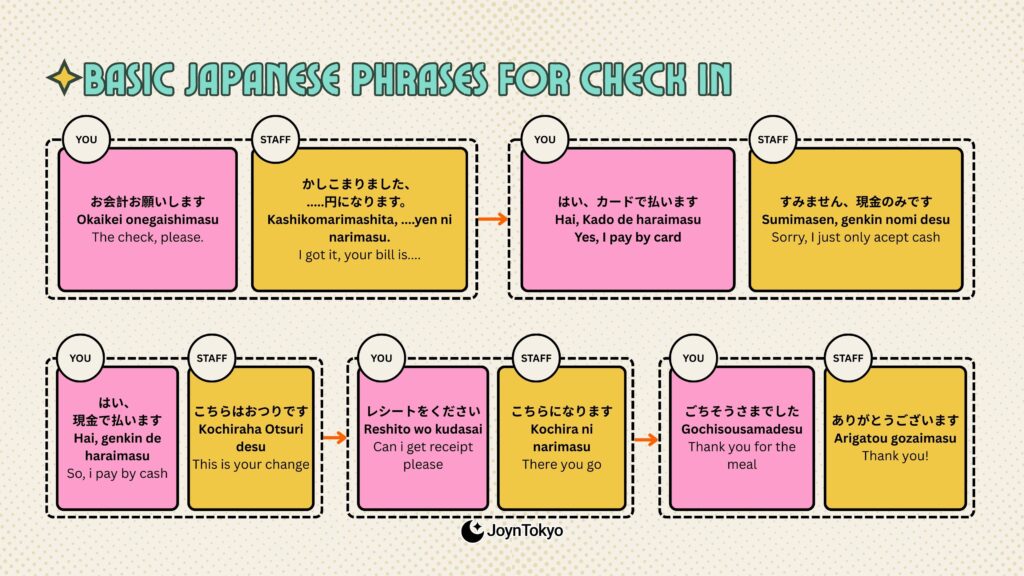
Paying the bill in Japan is slightly different from what many foreigners are used to. Instead of paying at the table, you usually bring the bill to the cashier near the exit. The staff may place a small tray with your bill on the table, which is considered a polite and discreet way to handle payment. Learning the right phrase to ask for the check ensures a smooth finish to your meal.
Okaikei onegaishimasu (お会計お願いします)
Meaning: “The check, please.”
Say this when you are finished and ready to pay. Staff will bring the bill to your table or ask you to bring the receipt to the cashier for the check. This is the usual way to ask for the check and not much commonly used in younger generations.
Oaiso/Okaikei onegaishimasu (お会計お願いします)
Meaning: “The check, please.”
Another common phrase carrying the same meaning. “Okaikei onegaishimasu” is the most commonly used phrase to ask for bill regardless of generations. It can be also said “Oaiso onegaishimasu”, though that it is mostly used by those of the elder persuation.
What To Say in Japanese When Leaving the Restaurant and Expressing Thanks
Showing gratitude when leaving a restaurant is an important part of Japanese dining culture. Even if you don’t speak much Japanese, saying a short phrase of thanks shows good manners and respect. Staff will often reply warmly, which leaves you with a pleasant final impression. This small exchange goes a long way in making your dining experience positive and memorable.
Gochisōsama deshita (ごちそうさまでした)
Meaning: “Thank you for the meal.”
Say this after finishing your meal, just before leaving the restaurant. It means general appreciation for the delicious meal. It’s not to be shouted, but saying this phrase at a level that the worker who was the closest to you is important. If you are at the restaurant where you can see the cooks, it will be nice if you can just give a glance to them and say it aloud.
Arigatō gozaimashita (ありがとうございました)
Meaning: “Thank you very much.”
Staff will often say this as you leave, but you can reply with the same phrase to show politeness. “Gochisousama deshita” is more common for locals, but using this phrase is also appreciated.
With a handful of expressions, you can smoothly navigate a Japanese restaurant from start to finish. Remember the basic flow: state your party size, call the staff with “Sumimasen,” order with “___ o onegaishimasu,” start your meal with “Itadakimasu,” and finish with “Gochisōsama deshita.” These phrases not only help you order food but also show respect for Japanese culture. With practice, dining out will feel natural, enjoyable, and stress-free.

